#ttrpg edits are hard.
Explore tagged Tumblr posts
Text
I made an Orym edit instead of writing or sleeping
#sleep drunk musical#🫣#ttrpg edits are hard.#edits are hard when you have visual cues.#this was a nightmare#like omfg#please clap#orym of the air ashari#orym savior blade of the tempest#cr orym#cr 3#the plot of this was supposed to be his slow decline into “doing what has to be done”#its mostly in timeline order#i tried to line up some good bits with “a man becomes a monster”#i feel like orym thinks of himself as “just a man” a lot#hes just a guard who experienced a tragedy#theres no other reason for him to be where he is except for the fact that he lost his family in the attack#he thinks its just happenstance#which. it kind of is#but him being just a man is also kind of the point.#demons run when a good man goes to war#(and tbh i wish that poem was better otherwise that would have been the edit)#maybe i still will#who knows#anyways heres an edit#cr edit#critical role edit#critical role
55 notes
·
View notes
Text

Weathers finally getting cooler so time to break out the Halloween dice 🎃
#dice#polyhedral dice#dnd dice#Halloween#my dice#q workshop#chessex#die hard dice#and a few other brands#the eye dice were handmade#sorry for rarely posting nowadays since making this blog I got a full time job#also I play a fuck ton of ttrpgs in my free time#most of them are pathfinder first edition now lol
164 notes
·
View notes
Text

THE TORTURED POETS DEPARTMENT COURSE CATALOG is a free solo journaling TTRPG by Max Alexander.
You are a grad student who needs to finish the last 10 poems of your thesis. Grab your typewriter, put Swift on shuffle, and get writing.
All you need to play TTPDCC is something to write with and a way to shuffle Taylor Swift's album THE TORTURED POETS DEPARTMENT: THE ANTHOLOGY. Writing poetry is optional!
For each song that plays, find the corresponding prompt. Answer the questions and record what happens, then optionally write a poem inspired by the event.

I edited this game and it's some of the most funny writing I've read in a TTRPG.
#ttrpg#indie ttrpg#solo ttrpg#the tortured poets department#max's prompt game is unreal and I laughed so hard when editing this
51 notes
·
View notes
Text

#dungeons and dragons#d&d#ttrpg#d&d 5th edition#d&d 5e#ad&d 1e#old school renaissance#osr#ad&d#d&d memes#ttrpg memes#dungeon master#dming is hard#dming
8 notes
·
View notes
Note
You speak of Postlimniae as a thing alive, now and again. You say she moves before you in the flitting of an eye. You say she sat with you in the blink, frail skin bearing what you could not.
You have mantrae, distraction and supplies to survive there. She has naught but you.
You wonder that it is her sort alone which can escape to that hoary nothing, with you in tow. You ask was it her that did this unrav'ling to you, if she is to blame.
I offer the elsewise hand-- a Mourning Cloak is sick. To be its pilot is to share the ailment betwixt your bloods. To know there is a sympathy between you will remove one spine off the world.
I.
Don't know what to think about this. We have been told, time and again, that Mourning Cloaks are neither sentient nor alive. I have spoken with the team that designs them, I know that the living tissue that they have has no neurons, no capacity to feel pain or anything else at all, and yet,
I see the way she moves when no one is in her, the way she braces for repairs or leans slightly into my hand. I feel her warmth even when her reactor is quiet. When I pilot her, I feel nothing returned across the neural link, no evidence that there is anything there to answer me but I can almost feel the frame anticipating my actions in a way that the hardware alone simply cannot.
It's why it's so hard to blame her, why every ounce of fear and resentment I feel is met by an endless wave of guilt, like I am condemning a friend for a fact of their nature.
But. I can talk to my friends and have them respond to me. I can tell them how I feel and learn how they feel in return. Even with my most fevered reaching, Postlimniae cannot give me anything other than the smallest of gestures, mere hints of sapience that make me wonder if its actually there or am I just imagining it?
I used to think that people who did this were. Imagining it. I would look to them and say "It is bad habit for you to anthropomorphize your mechs," I'd say "there's not even a person in there, not even a comp/con, a digitized pattern of thought, you are ascribing sentience to mere steel," and yet I don't know that I can say that anymore.
Maybe I am sharing her burden. Maybe one day she will be able to tell me anything about herself, instead of being a thing I project onto. I don't know, and I'm not sure if it will be real or merely the imagination of a lost, lonely girl if she does.
It's still harder if she's alive, I think. If she's just a machine it would be absurd to blame her for being left there. I don't know if I can untangle myself from her anymore, I certainly can't if we are left there again, but the upset I feel is not something I feel to mere machines, I think.
#asks#Anonymous#lancer rp#back from the blink#ooc: thank you this was lovely anon#ooc: if you want a me answer this is me doing things with ontology#ooc: not OOO actually i'm more properly a new materialist#ooc: vibrant matter did a lot of formative things to me and i think mechs in this case is an interesting way to explain#ooc: agency in what we would otherwise consider inert matter#ooc: what nera's struggling with is the fact that no matter is truthfully inert#ooc: i would say there is no hard line between alive and not in this sense just a long spectrum that#ooc: when you identify onto an object like a MC its hard to fall back into a pattern of seeing it as only inert#ooc: it is i think uniquely vibrant#ooc: edit: also bc a friend pointed this out to me#ooc: this is ALSO nera being used to taking any concerns she has and kind of just rationalizing them away#ooc: like this has been something thats been bubbling for a while but up until now she's been able to go#ooc: 'haha how could the mourning cloak be sentient theres nothing in there to be sentient'#ooc: to avoid all the peripheral questions here#ooc: recent events have made her unable to do that#lancer rpg#lancer ttrpg#lancer oc#oc rp
2 notes
·
View notes
Text
As a semi-professional homebrewer, the best advice I can give to get better at homebrewing is to live through a global pandemic just as you were getting into TTRPGs, then use homebrewing as a method of escapism during quarantine and to satisfy your fixation with the game while you don't have a group, so that your understanding of TTRPGs becomes inseparable from tinkering with rules.
#the second best piece of advice I can give is to go through SFF media you love#and steal ideas from there#not wholesale#just like#take the general idea and reproduce it within the rules#my third best piece of advice is be willing to be flexible#its hard to translate things from one medium to another#so don't be surprised if trying to take abilities directly from one magic system into another doesn't go perfectly#the core idea is the most important part#dnd#dnd5e#dnd homebrew#d&d#d&d 5th edition#d&d homebrew#homebrew#ttrpg
23 notes
·
View notes
Note
Doesn't Hasbro have a strong incentive to make a "lite" version of D&D with a pared-down paperback rulebook and sell it as a casual-friendly overpriced starter kit with a bunch of dice, figures, treasure cards, etc.? It could be a strict subset of the normal 5E rules (I guess - not that knowledgeable about TTRPG design). That way they could sell you all the same books. Seems like a slam dunk
Hasbro's present marketing strategy for Dungeons & Dragons is to try to position every D&D group as potential purchasers of every D&D product. Among other things, this is one of the main reasons that every campaign setting other than the Forgotten Realms is being repackaged as a series of tourist destinations for Forgotten Realms based campaigns to visit, and why there's been a strong move away from focused, topical sourcebooks and toward big, messy "book of everything"-style anthologies that consciously avoid focusing too much on any one type of character or campaign. It's also why the core books make a lot of noise about how wonderfully modular the rules are without actually providing any meaningful modularity in practice – if the game was designed to make it easy to pick and choose modular components, they'd risk fracturing the player base into distinct subsets with different preferred sets of modules.
All this in mind, it's fairly easy to see why there's currently no official "light" version of D&D. Under the paradigm of every single D&D group as a potential purchaser of every single D&D product, a version of Dungeons & Dragons 5th Edition that was actually, meaningfully simpler than the core product would function in practice as a competing game (what if people decide they like the simpler version better and just play that instead?), and the last thing you want is to compete with yourself. TSR learned that the hard way! With substantive simplification off the table, the only introductory version of Dungeons & Dragons Hasbro can offer is one with exactly the same rules which simply has less content, and tells people to buy the full version if they want more – which is exactly what they're selling in the various starter sets that are presently available.
2K notes
·
View notes
Text
The "Get Loud" TTRPG Bundle
About a month ago Charlie Hall, editor of tabletop games over at Polygon wrote an odd opinion piece. The gist of it was that since Wizards of the Coast is fumbling the bag with the release of the new edition of Dungeons & Dragons, now would be a great time for indie TTRPG makers to step up.
Above all, I feel it is imperative that indie designers realize that their window is rapidly closing. Rather than sitting in their own little corners of the internet and wringing their hands, creatives who want to thrive in the TTRPG space need to come together and fight for the recognition that they deserve. The dragon is knocked out for now, but it won’t be at rest forever. Only by building out a solid party, filled with individual contributors each possessing powerful skills, can they hope to one day face that dragon — or at least earn a place in the lair beside them.
This pissed off a lot of people. Including me. We aren't wringing our fucking hands out here, Chuck. We are loud about our games every hour of the goddamn day, and each time we encourage big media outlets like you to help, we see you wringing your hands about reader retention and clicks and all that horseshit.
We are not the cowards in this arrangement.
So as is my habit these days, I did some organizing about it.

I went through my list of games I've bought off itch and found my favourites, and my favourite designers. I contacted the ones I could (some of them didn't respond, said no, or I couldn't find ways to contact them) and put them together in a bundle. My friend Em did some art. I launched it on the 1st of February.
So far it has raised over $6,000. That's about $300 for each designer, depending on how they divvy up their cuts to itch, taxes, etc. That's money in the hands of indie TTRPG makers who aren't Wizards of the Coast. That's people being able to pay their bills and keep making games.
And not to mention it's 36 of my favourite games and 20 of my favourite game makers all in one place for the low low price of $20.
Being an indie creator is hard and thankless. We make things because we cannot help but be artists, and we are met largely with silence. We are expected to compete with companies who pay salaries to public relations people, who have marketing budgets and teams of artists, when all we have is a social media account, a mailing list, and the occasional crowdfunding campaign.
We are not saved by these companies, but by other small indie groups. By sites like Rascal who make game announcements easy, and the people who make YouTube channels and podcasts who play and read our games and let their fans know we exist. We are saved by people, not companies.
So if you buy the bundle, if you post about it on social media, or your work’s Slack channel, or write the link on the wall of the bathroom in that cool queer dive bar you like, thank you.
We can’t keep doing this without you.
#indie ttrpg#ttrpg#rpg#tabletop#art#ttrpgs#dungeons and dragons#indie rpg#indie games#indie#tabletop roleplaying#tabletop rpg#role playing games
401 notes
·
View notes
Text
Help Save the World of TTRPGs and Their Creators.
Okay I’m being a little dramatic, but at the same time I’m pretty serious. This is a call to action, and the livelihoods of myself and lots of other people, many of them (like myself) disabled, are depending on it. This is a post about why, what you can do about it, and (perhaps least often answered) how.
This post is actually an accompaniment to another discussion by someone else. If you don’t want to listen to a 90-minute in-depth discussion of much of what I’m about to tell you, you can just keep reading. Otherwise, click here or here and listen to this either before or after you read this post. (They’re the same thing, just different sources.)
If you have ever made or reblogged posts urging people to switch from Google Chrome to Firefox, you should be willing to at least give a try to other TTRPGs besides D&D5e for much the same principle reasons. I’m not telling you you have to hate D&D5e, and I’m not telling you you have to quit D&D5e, I’m just asking you to try some other games. If you don’t like them, and you really want to go back to D&D5e, then go back to D&D5e. But how can you really know you won’t like other games if you have literally never tried them? This post is a post about why and how to try them. If you’re thinking right now that you don’t want to try them, I urge you to look below to see if any of your reasons for not wanting to try them are covered there. Because the monopoly that WotC’s D&D5e has on TTRPGs as a whole is bad for me as a game designer, and it’s bad for you as a game player. It’s even bad for you if you like D&D5e. A fuller discussion of the why and how this is the case can be found in the links above, but it isn’t fully necessary for understanding this post, it’ll just give you a better perspective on it.
If you’re a D&D5e player, I’m sure at some point or another, you’ve been told “play a different game”, and it must get frustrating without the context of why and how. This post is here to give you the why and how.
[The following paragraph has been edited because the original wording made it sound like we think all weird TTRPGs suck.]
Before that though, one more thing to get out of the way. I'm going to level with you. There’s a lot of weird games out there.
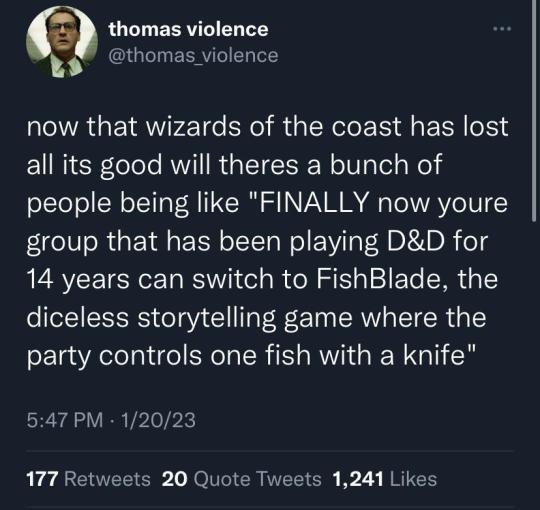
You are gonna see a lot of weird TTRPGs when you take the plunge. Many of them try to completely reinvent what a TTRPG even is, and some fail spectacularly, others really do even up doing something very interesting even if they don't end up being what a core TTRPG player wants. But not every indie RPG is a Bladefish, lots and lots of them are more 'traditional' and will feel very familiar to you, I promise. (And you might even find that you like the weird experimental bladefish type ones, these are usually ideal for one-session plays when your usual group can't play your usual game for any reason.)
You're also going to probably see a lot of very bad games, and man have I got some stories of very bad games, but for now I'm just saying to make sure you read the reviews, or go through curators (several of which will be listed below), before you buy.
Now that that is out of the way, I’m going to go down a list of concerns you may have for why not, and then explain the how.
“I don’t want to learn a whole new set of rules after I already spent so much time learning D&D5e.”
Learning a new set of rules is not going to be as hard as you think. Most other TTRPGs aren’t like that. D&D5e is far on the high end of the scale for TTRPGs being hard and time-consuming to learn and play. If you’ve only played D&D5e, it might trick you into thinking that learning any TTRPG is an overwhelmingly time-consuming task, but this is really mostly a D&D5e problem, not a TTRPG problem as a whole.
“D&D5e has all of these extra online tools to help you play it.”
So what? People have been playing TTRPGs without the help of computers for 50 years. To play a well-designed TTRPG you won’t need a computer. Yes, even if you're bad at math. There are some TTRPGs out there that barely even use math.
“I’m too invested in the narrative and characters of my group’s current ongoing D&D5e campaign to switch to something else.”
There are other games, with better design made by better people for less money, that are the same kind of game as D&D5e, that your current characters, lore, and plot will fit right into and do it better. And no, it's not just Pathfinder, there's others.
“I can’t afford to play another TTRPG.”
You probably can. If you’ve only played D&D5e, you might have been made to think that TTRPGs are a very expensive hobby. They aren’t. D&D5e is actually uniquely expensive, costing more than 3x more than the next most expensive TTRPG I can think of right now. Even on the more expensive end, other TTRPG books will cost you no more than $60, most will cost you less than $20, and a whole lot of them are just free. If you somehow still can’t afford another TTRPG, come to the A.N.I.M. TTRPG Book club mentioned below, nominate the game, and if it wins the vote we will straight up buy it for you.
(By the way, if you had any of the above concerns about trying other games besides D&D5e, that really makes it sound like you are in a textbook abusive relationship with D&D5e. This is how abusers control their partners, and how empires control their citizens, by teaching you to think that nothing could ever get any better, and even though they treat you bad, the Other will treat you even worse.)
“If I don’t play D&D5e, which TTRPG should I play?”
That’s a pretty limited question to be asking, because there will be no one TTRPG for everything. And no, D&D5e is not the one TTRPG for everything, Hasbro’s marketing team is just lying to you. (Pathfinder and PbtA are not the one system for everything either!) Do you only play one video game or only watch one movie or only read one book? When you finish watching an action movie like Mad Max, and then you want to watch a horror movie, do you just rewind Mad Max and watch it over again but this time you act scared the whole time? No, you watch a different movie. I’m asking you to give the artistic medium of TTRPGs the same respect you would give movies.
“I want to play something besides D&D5e, but my friends won’t play anything else!”
I have several answers to this.
Try showing them this post.
If that doesn’t work: Make them. Put your foot down. This works especially well if you are the DM. Tell them you won’t run another session of D&D5e until they agree to give what you want to do at least one try instead of always doing only what they want to do. This is, like, playing 101. We learned this in kindergarten. If your friend really wants to play something else, you should give their game a try, or you’re not really being a very good friend.
If that doesn’t work, find another group. This doesn’t even mean that you have to leave your existing group. A good place to start would be the A.N.I.M. TTRPG Book Club which will be mentioned and linked below. You can also go to the subreddit of any game you’re interested in and probably meet people there who have the same problem you do and want to put together a group to play something other than D&D5e. You might get along great with these people, you might not, but you won’t know until you try. Just make sure to have a robust “session zero” so everyone is on the same page. This is a good practice for any group but it is especially important for a group made of players you’ve just met.
“I only watch actual plays.”
Then watch actual plays of games that aren’t D&D5e. These podcasts struggle for the same reasons that indie RPGs struggle, because of the brand recognition and brand loyalty D&D5e has, despite their merit. I don’t watch actual plays, or else I would be able to list more of them. So, anyone who does watch actual plays, please help me out by commenting on this post with some non-D&D5e actual plays you like. And please do me a favor and don’t list actual plays that only play one non-D&D5e system, list ones that go through a variety of systems. The first one I can think of is Tiny Table.
“I can just homebrew away all the problems with D&D5e.”
Even though I want to, I’m not going to try and argue that you can’t actually homebrew away all the problems with D&D5e. Instead, I’m going to ask you why you’re buying two $50 rulebooks just to throw away half the pages. In most other good RPGs, you don’t need to change the rules to make them fun, they’re fun right out the box.
“But homebrewing D&D5e into any kind of game is fun! You can homebrew anything out of D&D5e!”
Firstly, I promise that this is not unique to D&D5e. Secondly, then you would probably have more fun homebrewing a system that gives you a better starting point for reaching your goal. Also, what if I told you that there are entire RPG systems out there that are made just for this? There are RPG systems that were designed for the purpose of being a toolbox and set of materials for you to work with to make exactly the game you want to make. Some examples are GURPS, Savage Worlds, Basic RolePlaying, Caltrop Core, and (as much as I loathe it) PbtA.
“I’m not supporting WotC’s monopoly because I pirate all the D&D5e books.”
Then you’re still not supporting the smaller developers that this monopoly is crushing, either.
Now, here’s the how. Because I promise you, there’s not just one, but probably a dozen other RPGs out there that will scratch your exact itch.
Here’s how to find them. This won’t be a comprehensive list because I’ve already been typing this for like 3 hours already. Those reading this, please go ahead and comment more to help fill out the list.
First, I’m gonna plug one of my own major projects, because it’s my post. The A.N.I.M. TTRPG Book Club. It’s a discord server that treats playing TTRPGs like a book club, with the goal of introducing members to a wide variety of games other than D&D5e. RPGs are nominated by members, then we hold a vote to decide what to read and play for a short campaign, then we repeat. There is no financial, time, or schedule investment required to join this book club, I promise it is very schedule-friendly, because we assign people to different groups based of schedule compatibility. You don’t have to play each campaign, or any campaign, you can just read along and participate in discussion that way. And if you can’t afford to buy the rulebook we’re going to be reading, we will make sure you get a PDF of it for free. That is how committed we are to getting non-D&D5e RPGs into people’s hands. Here is an invite link.
Next, there are quite a few tumblr blogs you can follow to get recommendations shown to you frequently.
@indierpgnewsletter
@indie-ttrpg-of-the-day
@theresattrpgforthat
@haveyouplayedthisttrpg
@indiepressrevolution
Plenty of podcasts, journalists, and youtubers out there do in-depth discussions of different systems regularly, a couple I can think of off the top of my head are:
Storyteller Conclave (I’m actually going to be interviewed live on this show on April 10th!)
Seth Skorkowsky
Questing Beast
The Gaming Table
Rascal News
Lastly, you can just go looking. Browse r/rpg, drivethrurpg.com, indie press revolution, and itch.io.
Now, if you really want to support me and my team specifically Eureka: Investigative Urban Fantasy, our debut TTRPG, is going to launch on Kickstarter on April 10th and we need all the help we can get. Set a reminder from the Kickstarter page through this link.
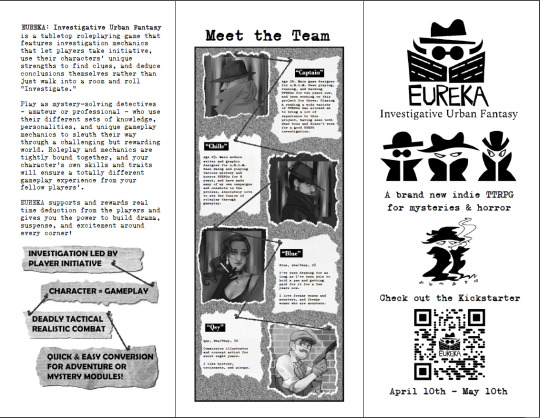
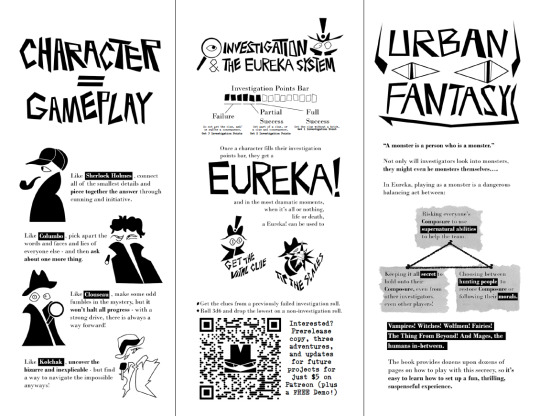
If you’re interested in a more updated and improved version of Eureka: Investigative Urban Fantasy than the free demo you got from our website, there’s plenty of ways to get one!
Subscribe to our Patreon where we frequently roll our new updates for the prerelease version!
Donate to our ko-fi and send us an email with proof that you did, and we’ll email you back with the full Eureka prerelease package with the most updated version at the time of responding! (The email address can be found if you scroll down to the bottom of our website.)
We also have merchanise.

#dnd#dnd5e#dnd 5e homebrew#dungeons and dragons#d&d#d&d 5e#dungeons and dragons 5e#dnd 5e#5e#homebrew#dungeons & dragons#critical role#crit role#dimension 20#actual play#matt mercer#wizards of the coast#wotc#hasbro#ttrpgs#ttrpg#ttrpg community#ttrpg tumblr#tabletop#roleplay#roleplaying#roleplaying games#tabletop roleplaying#tabletop role playing game#fantasy rpg
1K notes
·
View notes
Text
a game where we hurt each other
Last month, I played perhaps the most intense TTRPG session of my life as part of the Dream Library’s discussion of Bluebeard’s Bride, a game of “feminist horror” (more on this later) published by Magpie in a gorgeous print edition. Over the course of the month of October my guest lecturer/collaborator @marvelousmsmolly I collectively hosted three sessions of what was by far the most challenging game the Dream Library has ever discussed.
We came to Bluebeard as the second part of our fall semester covering games of intimacy and monstrosity — a unit which began in September with Avery Alder’s Monsterhearts 2 and is continuing this month with Vampire: The Masquerade (If you want to get in on the VTM discussion and future semesters, please, come join). Both Molly and I suspected that Bluebeard was going to be both a quieter month and a riskier text — but opted to play through it anyway, albeit with some tools in place to make sure everyone knew what they were getting into with a book that doesn’t pull many punches. And with all that, the first two sessions went... fine? We had some lumpy pacing, some conflicting styles of play, some questions about how a game that really seems to encourage player bleed can possibly be played online, but for the most part things were fine. Not great, not bad — not worth the anxiety we’d had about them.
And “fine,” of course, doesn’t make for interesting conversations, so Molly and I took a step back. We talked about what was going wrong: a sense that neither of us quite felt comfortable hitting hard enough, even though we asked players ahead of time and at the start of sessions to tell us what was off the table. A frustration that player choice had trended towards the Bride as a detective/hero and not someone embodied in a world of horror. A confusion — once again — over what it means to “shiver with terror” in a discord call with some friends online. Out of that conversation came a new idea: rather than two more one-shots, Molly took some time to charge up a spirit bomb and put together some more formal prep, then recruited a group she felt could get together for a more curated experience. She wrote up her own excellent thoughts on what went down — along with a lot of session details — but you’ll have to join the Dream Library for that.
The result of all that curation and preparation was that on October 23rd a group of four trans women — Molly, @jdragsky, our friend Mars, and I — sat down to play Bluebeard’s Bride knowing exactly what we were in for. We would be playing a transfem Bride, Bluebeard would be cis, and we would be hitting transfem-specific horror as hard as we possibly could.
I’m going to quote from Molly’s reflection, where she wrote:
“Another really great aspect of running this game for this table is there was such a clear feeling that we all understood, wordlessly, what was going on... There are some moments in Allison Rumfitt’s gothic horror novel ‘Tell Me I’m Worthless’ where it felt like the author, a trans woman, was dropping phrases knowing exactly how her transfem audience would react... This had a twofold effect of both giving the players a chilling moment but also, a very brief but appropriate separation between fiction and player where could all grimace and be together in that discomfort before pushing on. People knew what I was doing. The problem with the original game is it doesn’t really want to discuss the politics of what “feminine horror” means. Because of this you’re really lacking some focus. I think a table of cis women could actually play bluebeard’s bride in the way we did last night and have it hit hard for them if they approached it correctly, I don’t think our experience was uniquely elevated by our trans reading, however that was one of several tools we used for that elevation.”
Setting aside the strengths and weaknesses of the original text, that sense of shared experience was key to our game and key to allowing us to hit — and get hit — really hard and trust that our coplayers were there with us. Compared to our earlier efforts (prioritizing safety by taking things off the table via lines/veils) tightening the topical scope from an ambiguous “feminist horror” to a specific transfeminist horror in the context of a chaser bf, in the context of an economic disparity, in the context of the medical pressures of transition in the contemporary U.K. allowed Molly, our lovely host, to hurt us knowing that we were all in it together and choosing to play this game. It transformed the horror from an obstacle in an adventure game into a thing we were seeking out: a pleasure/pain we asked to feel.
In a games discourse that is — understandably — interested in protections which might be implemented anywhere, including at cons and home tables with much less of an art-and-politics interest, safety tools are often thought about as a negative thing, a preemptive cutting away of all the things which might end up hurting us. I think that’s part of why people can have a hard time filling out a lines/veils list in advance of a session. What are all the things in the world I’m sensitive to? What are all the contexts in which I’m sensitive to them? Good sensitive or bad sensitive? Sensitive enough to cause a scene? Sensitive enough to make it off the table?
In place of that — and in a table with a really remarkable amount of trust — this final Bluebeard session leaned in, hard, to the things that hurt us. That was the game. Molly wrote a lot about kink in her reflection, and I think she was right to do that. The point of the game was to hurt each other and to feel, and it was a better game for keeping that in mind. It was an actual horror game, and not just a game with horror aesthetics. I agree with Molly that there was nothing essential about having an all-transfem table — I think what we did could be done by anyone, even with the base Bluebeard’s Bride. What was essential was having a table where we all trusted each other enough to play a hurting game and to know that we were there on purpose. It elevated Bluebeard’s Bride into a really fascinating, messy experience — one I can’t wait to play again.
359 notes
·
View notes
Text
Transgender Deathmatch Legend II is out now on Itch! A beat-em-up/fighting game that uses trick taking card play to resolve combat, designed for two players. Across seven scenarios fight for retribution, cash, justice, survival, glory and more!
Step into the shoes of a hard done by trans wrestler in the city of Slamchester, put the HRT in hurt, and put the hurt on anyone who tries you.






Featuring:
Easy to grasp and intuitively tactical rules
Four Unique Fighting Styles
Seven Hyperviolent Hexcrawl Scenarios
Vibrant and raw photography throughout
Templates and instructions for online play
Alternative Rules Accommodating More Players
Arcade Mode!
Tag Team Turmoil!
(You can still pre-order the physical edition and get your order folded into fulfilment of the initial campaign)
131 notes
·
View notes
Text
Trans made TTRPGs
Due to… recent events that I would rather not talk about, today's post is a highlight of different tabletop games made by trans peeps! These games are fantastic in their own right, of course, but you can also know that they were made by incredibly cool and attractive people
(Also, these are flyover descs of the game, they'll get more in-depth singular posts later, this is because I am lazy)
Perfect Draw is a phenomenal card game TTRPG that was funded in less than a day on backerkit, it's incredibly fun and has simple to learn hard to master rules for creating custom cards, go check it out!
Songs for the dusk is fucking good, pardon my language, but it's a damn good post apocalyptic game about building community in a post-capitalist-post-apocalypse-post-whatever world. do yourself a favor and if you only check out one game in this list, check this one out, its a beautiful game.
Flying Circus is set in a WW1 inspired fantasy setting full of witches, weird eldritch fish people (who are chill as hell), cults, dead nobility, and other such things. It's inspired by Porco Rosso primarily but it has other touchstones.
Wanderhome is a game about being cute little guys going on a silly adventure and growing as the seasons change, its GMless and very fun
https://weregazelle.itch.io/armour-astir Armour Astir has been featured in here before but its so damn good I had to post it twice. AA demonstrates a fundamental knowledge of the themes of mech shows in a way that very few other games show, its awesome
Kitchen Knightmares is… more of a LARP but its still really dang cool, its about being a knight serving people in a restaurant, its played using discord so its incredibly accessible
https://grimogre.itch.io/michtim Michtim is a game about being small critters protecting their forest from nasty people who wish to harm it, not via brutal violence (sadly) but via friendship and understanding (which is a good substitute to violence)
ok this technically doesn't count but I'm putting it here anyways cuz its like one of my favorite ttrpgs of all time TSL is a game about baring your heart and dueling away with people who you'll probably kiss 10 minutes later, its very very fanfic-ey and inspired by queer narratives. I put it here because its made by a team, and the expansion has a setting specifically meant to be a trans "allegory", so I'll say it counts, honestly just go check it out its good shit
https://willuhl.itch.io/mystic-lilies
Mystic Lillies is a game inspired by ZUN's Touhou Project about witches dueling powerful foes, each other, and themselves. Mystic Lillies features rapid character creation and a unique diceless form of rolling which instead uses a standard playing card deck.
https://preview.drivethrurpg.com/en/product/141424/nobilis-the-game-of-sovereign-powers-2002-edition I… want to do a more general overview on Jenna K as an important figure in indie RPG design, but for now just know that Nobilis is good
https://temporalhiccup.itch.io/apocalypse-keys Apocalypse Keys is a game inspired by Doom Patrol, Hellboy, X-men, and other comics about monstrousness being an allegory for disenfranchisement. Apocalypse Keys is also here because its published by Evilhat so its very cleaned up and fancy but I love how the second you check out the dev's other stuff you can tell they are a lot more experimental with their stuff, this is not a critique, it is in fact a compliment
Fellowship! I've posted about this game before, but it is again here. Fellowship has a fun concept that it uses very well mostly, its a game about defining your character's culture, and I think that's really really cool
Voidheart Symphony is a really cool game about psychic rebellion in a city that really does not like you, the more you discover for yourself the better
Panic at the Dojo is a phenomenal ttrpg based on what the Brazilian would call "Pancadaria", which basically means, fucking other's people shit up. Character Creation is incredibly open and free, meaning that many character concepts are available
Legacy 2e is a game about controlling an entire faction's choices across time, its very fun
remember to be kind to a trans person today! oh also don't even try to be transphobic in the reblogs or replies, you will be blocked so fast your head will spin
#indie ttrpg#ttrpg community#ttrpg indie#ttrpg#trans creator#trans#trans pride#queer#queer creator#perfect draw#wanderhome#songs for the dusk#flying circus#armour astir#michtim#thirsty sword lesbians#mystic lillies#apocalypse keys#fellowship#ttrpg of the day
673 notes
·
View notes
Text

Another big month of TTRPG mail calls! Got a bunch of zines, some Crowd funders, and treated myself to a book or two when I got my new job lined up.
Here's what's exciting from the last month:
Death of the Author: I've said before that we (as in I) love the work of Sam "@goblinmixtape" Leigh, and before I got into TTRPGs, I wanted to do fiction writing (I found that I got from TTRPGs what I wanted from writing). So the pitch felt like an instant yes: A solo RPG about writing fiction, and the relationship between author and character.
The World we Left Behind: Sam Leigh put this together apparently for a Ballet, which is incredibly cool, and then put it as an add-on for the Death of the Author campaign. Needless to say, I was all in.
Urban Shadows 2e: Backed this on Kickstarter before Magpie did the A:tlA campaign, and it's finally showed up now. If I'm honest, my interest has waned, but I know US 1e was really good.
Zephyr: The art and the concept behind this are great, and I know that the creator makes some really neat mechanics.
Glitch: I picked this (well, 0 edition of Glitch) up on Kickstarter years ago, because the pitch was so good, but I didn't get a hard copy then. Managed to use some DTRPG money I had to rectify this mistake. Jenna Katerin Moran's work is very philosophically interesting, but I was hooked by the notion of being a demigod who knows that there's more going on, but is going to deal with street level concerns.
The Flood: Also a Moran game, and came to be as part of The Far Roofs (which I'm sure will be featured in a future mail bag post). There's a beauty to Jenna's work, a blending of metaphor and reality that I'm really drawn to, so I'm very curious about how farming poetry will work out.
Reach of the Roach God: When I landed my new job, I pretty quickly landed on what I wanted to pick up. I found out about the Thousand Thousand Island books a little too late, so I wanted to make sure I snagged this beautiful volume before I couldn't find it anymore. It's a real triumph of a book, and I can't wait to dig deeper.
Ironsworn: Sundered Isles: I am on record as loving Ironsworn and Starforged. What if instead of Space, we had Pirates?! Hell yeah, sign me up. Ironsworn/Starforged are probably the solo RPGs I've had the most success playing, in that I got furthest into these before getting distracted by other things. So maybe I'll get myself into another one?
The Wizard's Library: I've been really intrigued by Vincent Baker's Wizards Grinoire series, although I've read (and not yet played) only the first. It's got a neat reverse relationship, where the "GM" player is the titular Wizard, and the other players run the supporting cast, helping the Wizard delve into the grimoires that they discover Fortunately, this book contains more grimoires for the titular wizard to go through, and with them, more dangers for the wizard to face.
Fabula Ultima: I've heard only good things about this self-billed "TT-JRPG" and I'm really curious about it. Final Fantasy and the Pokemon series both being such long-term loves of mine, I'm very curious to see how this one runs. (Also picked up the Quickstart for a future Mailbag.)
Wet Grandpa: Listened to an episode of RTFM about this, after seeing the name around for years, and finally picked it up. I always found the title off-putting, and really couldn't get past it until my favorite TTRPG Book Club Podcast dragged me through the cover. The physical edition is a beautiful, rugged-looking book and my mind keeps reeling at the possibility of making players make hard choices.
Psychodungeon: I really dug the pitch, and Kayla Dice makes some really fun and interesting games. Be part of a team that helps people manage their trauma after it manifests into a psychic dungeon. What intrigued me most was the use of the Belonging Outside Belonging system for this, which I think really opens up some interesting possibilities for the Workplace Drama angle, and the GMless aspect could lead to some extremely fascinating dungeons.
Stewpot: This one as a no-brainer. I've got lots of friends who are into the "cozy" genre of game, and Stewpot has been The Name in fantasy coziness for a while (for lack of a better terminology, as I know it's a loaded term). The special edition (and wooden dice) were too tempting, even though the crowdfunder hit during my Freelance Era, and cost a few extra...
Any%: I watched the HBomberGuy video about Speedrunning (shortly after his Plagiarism video dropped), and developed a soft spot for the hobby. I genuinely couldn't do it, I'm too ADHD to try the same thing over and over again in hopes of shaving a fraction of a second off of my response time. But, I'm glad that people are doing it. So, a solo RPG that plays with speedrunning and its terminology seems like a great way to feel like I'm doing it without all the Bad Brain Juices.
Pregame Lobby volumes 1 and 3: I also wanted to grab these before they became too hard to find (I can't find anywhere that has Volume 2 at the moment). I really like the vibes of .Dungeon, it feels like a game that evokes a period in my life where I was curious about the Internet and tried just about every MMORPG that wasn't WoW or EverQuest. I'm honestly struggling to not pick up the recent Spiral Bound edition, despite getting the hardback 2e, because the art and layout looks goddamn incredible.
And these books are from the Plus One EXP Zine Club, which is a Zine of the Month Club, hand-picked and hand-curated. So I'm excited because I don't actually know much about them.
Metalepsis
Fire & Stone
Hapsy Kordo's Kitchen Horrors
This Old House
Hive of the Crawling Creeps
Fallen from Grace
#indie ttrpg#ttrpg#ttrpg design#ttrpg mail call#indie ttrpgs#fantasy ttrpg#scifi rpg#fabula ultima#.dungeon#stewpot#ironsworn#solo ttrpg
78 notes
·
View notes
Text
Help out my TTRPG!
Hi everyone! Do you want to help me out a bit? RPG.net has an enormous archive list of TTRPGs, complete with information about them and reviews. It may seem a little old fashioned, but this is actually a great resource, and tons of people use this to find out about games. I'm embarrassed to say that until this week my game The Magical Land of Yeld: 2nd Edition didn't have an entry on the site. Now it does! You can REALLY help me out by leaving a short review, rating or comment on the page. It only takes a minute! Just something like: "I've played this game and its fun" "Here's what I like about Yeld" "Neat book. Love the art!" "Haven't played it yet, but I want to." Comments or ratings REALLY help. reviews help more, even if they're short. People really do look at these and then decide to check out the game. So if you have a few minutes, make an account and leave a comment. As a side note, RPG.net is a pretty solid community, and has come out hard in support of queer people.

Get the hardcover Yeld rule book and PDF from the Yeld site, IPR or Tabletop Bookshelf. The PDF is also available from DrivethruRPG and Itch.
60 notes
·
View notes
Text
So, you wanna play a Pokémon TTRPG
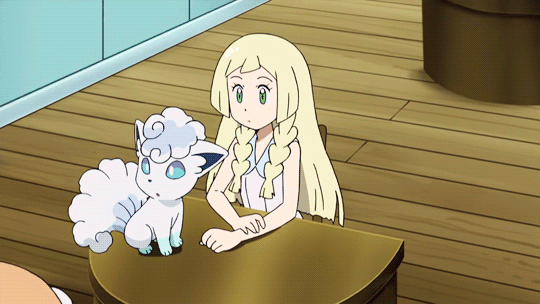
But you don't have the time to manage 1K entries in a book? Well, I'm working on the thing for you! PokéD6.
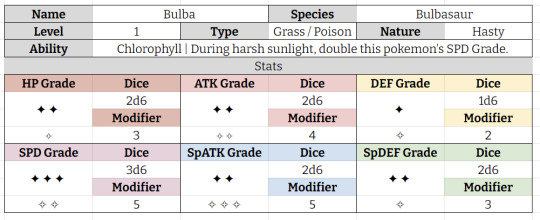
Now that I've show you my character sheet concept, let me break down some of the things on it. The biggest thing anyone will notice right away is the lack any numbered stats. This system converts existing BSTs (Base Stat Totals) into a 6 point grade. Above, each black diamond (✦) represents one point of that stat's grade. And any pre-existing pokemon can have it's BST quickly converted by simply dividing any given stat's total by 36 and rounding up, to a max of 6! Each grade also has an associated number of dice, which are always equal to the grade itself, and an associated modifier. A stat's modifier is equal to it's grade plus it's IVs. IVs, represented by the hollow diamonds (✧), have also been simplified down into a single dice roll per stat. So, whenever you capture a new pokemon, roll 6d6. Like with stat grades, each diamond represents the IVs value. IVs cap out at 3.
But, you may find yourself asking, what do Stat Dice and Stat Modifiers even do?

Currently, they're for combat! While the attack itself determines how much damage it can do, the pokemon's stats determine if the attack hits, it's minimum damage, how hard they are to hit, and even how much they can reduce the damage! When attacking, say with a Physical Move, the attacking pokemon rolls 1d6 + their ATK Modifiers against the defending pokemon's DEF Modifier + 3. If the attack hits, roll the move's Power and add any bonuses given. Such as Same Type Attack Bonus (STAB) or type effectiveness. The defending pokemon rolls their DEF Dice, subtracting their result from the Power roll.
Power has now been converted into d6s, to find a pre-existing move's Power divide it's power by 25 and round up! With the exception of very high damaging moves, most moves deal 1d6 to 6d6 damage.
So a move like Tackle deals 2d6 damage.
I could go on, but for now I want to leave this here and just see what people think! I've enjoyed working on it and am pretty close to being able to do a simple beta of it. So, have a copy of the pdf and lemme know what you think!

EDIT (4/20/24): Yo what if I just suddenly dropped even more rules in this post? Yea? Yea! So here's how trainers work!

Trainers are divided into four Careers; Field Researcher, League Challenger, Contest Coordinator and Pokemon Breeder! These careers determine starting gear, recommend a set of skills (more on those later!!!), and determine how the player can make money. Field Researchers are basically the intern equivalent of a Professor's Aide! They go out, encounter as many new pokemon as possible, and get paid a weekly salary! They can even earn bonuses for finding odd pokemon, such as ones with unusual movesets~! League Challengers are pokemon trainers like in the games! Beat gyms, get badges, take on the champion. Easy as! They get paid based on the trainers they defeat, which can be picked up at a PokeCenter or just given to them immediately. Contest Coordinators focus on training pokemon for Gen 3 style'd Contests! They make money by winning contests, with each rank paying out higher rewards! And lastly, Pokemon Breeders! Like the name says, they make their money by breeding and raising pokemon at the requests of the Pokemon League or other trainers. The more specific the request, the more money they earn for it!
Trainers also have skills! These work a lot like Stat Grades, but they don't have an associated modifier. When making a trainer, a player picks 6 skills out of 12. Players then have 18 points to distribute however they want into those 6 skills, up to a maximum of 5. The other skills are left at 1. The skills available are: Archeology, Cheering, Climbing, Cooking, Fishing, Foraging, Knowledge, Nursing, Riding, Sneaking, Spotting and Swimming!
I'm currently working on reformatting the doc so enjoy the new tidbits for now! See you again when I've finished the doc!

159 notes
·
View notes
Text
I am no longer working on 5e content, BUT!
So, an amount of time has passed and a number of things have occurred which, skipping past the gory details, has led me to no longer working on content for 5th edition D&D. This sounds like a travesty, but it has given me time to direct that passion elsewhere, an elsewhere which may or may not be relevant to you, so if you would join me for a moment, allow me to take you on a trip back in time for some context.

A few years back, I was fresh off a long-running campaign with some friends and looking for something new to do. I had been running games in vallonde for years and, as much as I love the setting, I needed a vacation from my son, so to speak.
I was in the process of streaming a playthrough of Ogre Battle 64 and thought "Hey, I really love these games and the setting, why not put some effort into making a little setting guide and running an Ogre Battle campaign?" Sounds great, right? Lots of politics, nuanced heroes, villains both relatable and cartoonish...I really could go on about OB forever but I'm going to refrain because that's not what this is about. What it IS about is boring historical events concerning this specific nobody, and in this specific case I spent maybe 2(ish?) weeks combing the internet for everything I could find related to Ogre Battle: Characters, nations, cities, classes, calendars, timelines, and so on, until I had a pretty extensive catalog of content I could start turning into plots and adventures. This was all going really well, and had a lot of promise, until random happenstance caused me to lose it all.
Now I had to make a decision. Did I want to go back to square 1 and start all over again, or did I want to just give up? Apparently the answer was neither because in that moment I had a thought: Why was I putting so much work into collecting all this information and twisting the 5e mechanics into some crazy shape they were never meant to be in when I could just make my own game? At first it was mostly just an itch in the back of my mind but eventually I say down to see if I could reasonably pull of what I wanted, which was essentially a tabletop game built specifically for Ogre Battle games, which utilized the mechanics found throughout the games, as well as things like classes and monsters. After working over some basic designs, I finished the rules for the combat system and knew there was a game hidden inside this idea.
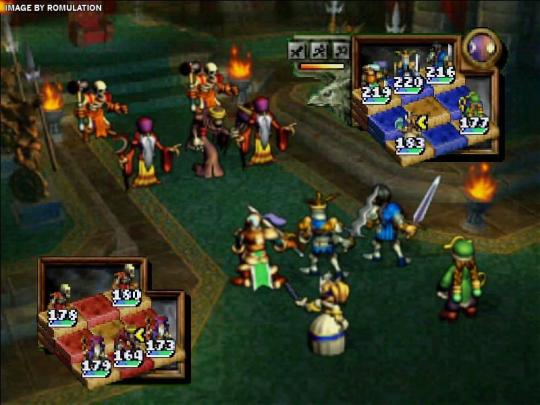
Let's go ahead and bring it back to the present day. I never actually stopped working on content, I've just put all of that time into developing a game of my own design. In that time, I've gone through multiple iterations of a game that has grown far beyond its original aspirations as well as its design as an Ogre Battle TTRPG into something I'm excited to call my own. The project now goes by the name Celestial Solstice and is, more-or-less, done. It's really hard for me to describe the game's focus, but let me try to lay out what makes it special:
A truly balanced pillar trio: The game is built to make every theoretical playstyle a viable path toward advancement. Battle, exploration, and social content all hold the capacity for meaningful advancement.
A game of procedures: Taking a note from the mechanical procedures of older TTRPGs and select board games, Celestial Solstice uses closed, ordered feedback loops to organize the gameplay experience. All three gameplay pillars get their own unique style of play which is supported with character options.
No character limits: There are a massive amount of character options for people who love building characters. A three-tier job system with a total of 6 tier 1 jobs, 12 tier 2 jobs, and 12 tier 3 jobs means you can mix and match to create your own unique class. There are no character levels, and players instead buy character upgrades using EXP they earn for overcoming challenges. These EXP can be used to upgrade attributes, buy new features, and acquire and improve skills.
Gathering & Crafting: A large amount of focus on gone into incorporating gathering of raw materials and the crafting of those raw materials into usable items into the game. Forestry pairs with woodworking, herbalism with alchemy, mining with blacksmithing, and skinning with leatherworking to give players a wide assortment of options whether they want to do some crafting on the side or dedicate their entire character to the concept. There's also a system for enchanting items with magical effects which KINDA counts as crafting, right?
Control an army: The game is designed from the ground up for the recruitment of NPCs as well as the hiring of retainers, mercenaries, and employees. Recruit up to 50 characters which can participate in the game just like PCs do, going on adventures, gaining EXP, and improving over time. There's also a whole player-owned base mechanic which acts as the home for your ever-growing army.
A unique, fast-paced battle system: The battle system is modeled after the unit grid based system found in Ogre Battle 64. Emphasis is placed on battles that resolve quickly to prevent burnout yet allow players to roll lots of dice and make strategic decisions that matter. In this system, strategic unit placement is just as important as good dice rolls.
It's a point crawl system!
Random generation tables EVERYWHERE!
And honestly much more!
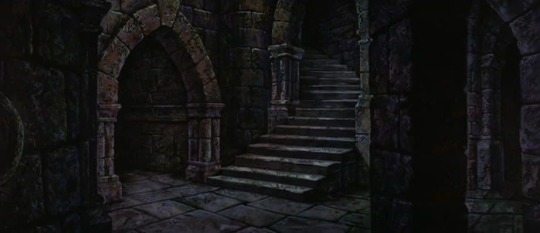
This are no plans for this to be a commercial project, at least not any time soon, but with that said it is technically a playable, complete game that is being iterated and improved upon over time. At the end of the day, I'm writing this post as a stupidly long-winded way to ask: Would anyone here be interested in seeing this blog turn into something dedicated to my personal TTRPG system? It's never going to be a 5e blog again, but I'd hate to let it wither away to nothing after such a long history. If so I'll start making posts describing the mechanics of my system and giving behind the scenes looks at how and why some of the design decisions were made, but I understand if people aren't interested in following a project they can't incorporate into the own games. Lemme know, cause I like you guys and would love to share this project that has become so close to me, but I get it, it is what it is lol.
Thanks for reading, and good gaming regardless!
- Forge
19 notes
·
View notes